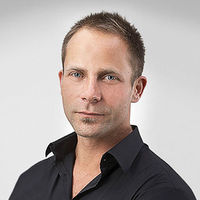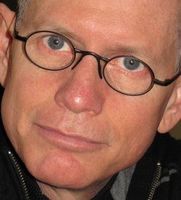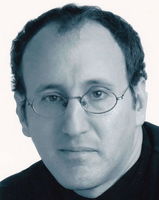"True Stories are Always the Best Stories & They Can Be the Toughest to Write": The 2018 RBC Taylor Prize Finalists on Non-Fiction
On Monday, the 2018 RBC Taylor Prize for Non-Fiction will be presented to one of five shortlisted authors. This year's list is an eclectic one, making it tough to predict a winner in this strong crop of true stories.
Stephen R. Bown's Island of the Blue Foxes: Disaster and Triumph on Bering's Great Voyage to Alaska (Douglas & McIntyre) delves into a historically doomed expedition; Daniel Coleman's Yardwork: A Biography of an Urban Place (Wolsak & Wynn) meditates on the role of nature and urban green space in questions of identity and belonging; James Maskalyk's Life on the Ground Floor: Letters from the Edge of Emergency Medicine (Doubelday Canada) examines the state of emergency medicine and its unsung heroes both in Canada and the Global South; Tanya Talaga's Seven Fallen Feathers: Racism, Death, and Hard Truths in a Northern City (House of Anansi Press) investigates the deaths of seven Indigenous youths and strips bare Canada's failings regarding Indigenous people; and Max Wallace's In the Name of Humanity: The Secret Deal to End the Holocaust (Allen Lane Canada) shares a fascinating and unknown story about a Jewish freedom fighter's race to rescue concentration camp victims near the end of WWII.
We're excited to speak to all five of the finalists today in a brief Q&A about the nature and value of non-fiction and how each of the authors is dealing with his or her prestigious nomination.
We hear from the finalists about the balance between fact and fancy in non-fiction, their favourite non-fiction reads, and each writer's version of the perfect celebration after years of hard work on their books.
Open Book:
What do you love most about reading and writing non-fiction, and how do you personally judge the merit of a book of non-fiction?
Stephen R. Bown:
What is important to me in reading non-fiction is finding a book that is impressively imaginative, while being factually correct. Fiction writers must imagine and create the events and situations of their characters, so as to explore the broader themes of their story. Non-fiction authors, by contrast, collect and organize the factual information available to pull themes and issues from known events and facts – to see what the story can tell or teach us, rather than invent a story to illustrate those specific themes and ideas. Neither is better than the other - they are flip sides of the same coin. A pedantic recitation of facts doesn’t make an insightful and interesting non-fiction book any more than a dull fictionalized story does service to an author’s themes or ideas.
As I see it, a non-fiction writer’s job is to collect and interpret facts to reach a closer understanding of known historical or contemporary people, or of the world around us. To do so requires imagination, to see patterns and understand the motives and relationships or to come up with a new way of framing news or historical events. In my view, the ideal non-fiction book makes complex ideas seem simple so that I can easily understand what’s important. And it does so with words and structure that make me smile with their ingenuity and creativity.
Writing and reading are different things, and I enjoy reading all sorts of books on topics that have nothing to do with what I write. I’ll go almost anywhere with authors who know how to make their books interesting, wise, and lively.
Daniel Coleman:
I love non-fiction that facilitates meditation—the slow unravelling of a line of thought or feeling that allows me as a reader and writer to come to new insight and new perception. We live in a culture of hurry and distraction, so I find it a particular relief and a necessary retraining of mind and heart to stay with something—an idea, an emotional texture, a well-wrought pattern of language—for an extended period. For this reason, I look for good writing, for sentences and words that can lift and energize the content without a desperate need for sensational events, heart-pounding plots, or even for information. I gladly read fiction or journalism or scholarly writing for those things. I turn to literary non-fiction as a companion for contemplation.
James Maskalyk:
I question whether true non-fiction is possible. It is always, even if pure science, from the vantage of an individual's consciousness, prone to the inherent flaws of view, memory, intention. That is what I like about the form. It draws from reality and puts me in another person's eyes, or the reader's in mine, trims out the non-essential so we can live, at least briefly, another life. The skill at which the author does this, takes a fractal of our human past, magnifies it into visible patterns that run through my experience, is the essential part of the craft. I know I've read a good one when I put it down, and the world has grown, even a micrometer, bigger.
Tanya Talaga:
True stories are always the best stories and they can sometimes be the toughest to write. Presenting facts in a readable, engaging way that leaves the reader learning something at the end of the book is the goal. If I read a book that has done that, that has left me touched and better-educated or changed in some way, that is how I know the book has succeeded.
Your CanLit News
Subscribe to Open Book’s newsletter to get local book events, literary content, writing tips, and more in your inbox
Max Wallace:
My favourite thing about reading and writing non-fiction is the element of surprise. As an author researching a book, I revel in discovering information that I wasn’t at all expecting when I set out on my quest. There is nothing more exciting than a discovery that sends me off in an entirely new direction and stands my original thesis on its head.
As a reader, I am also thrilled when I’m forced to re-evaluate my thinking on a subject and discard everything I assumed I knew before I opened the book. I often find myself judging a non-fiction book by whether it has accomplished that.
OB:
Tell us briefly about a favourite non-fiction book you've read.
SRB:
I browsed my bookshelves to answer this question and rediscovered Monster of God: The Man-Eating Predator in the Jungles of History and in the Mind, by David Quammen. It’s an older book (2003) that has the advantage of having a great cover that features a painting of the torso of an enormous tiger with its jaw open. What makes this book stand out after all these years is the lively language and the blend of historical stories that involve the preservation, hunting or even worship of tigers, lions, bears, alligators, crocodiles, etc. with a discussion of the contemporary philosophical, religious, economic and scientific beliefs surrounding these dangerous but nearly extinct creatures today. “Dangerous predators,” Quammen writes in one chapter, “of whatever species, are more easily admired from afar... a hard-headed humanist could argue that exterminating all alpha predators is basic to the enterprise of civilization, and that it’s only distant, safe, hypocritical sentimentalists (like you and me) who might assert otherwise. This is a serious view that needs to be heard and addressed.” He then launches into a discussion that shows why not everyone is always in favor of wildlife preserves and conservation: it is usually disadvantaged rural peasants worldwide who bear the brunt of the negative consequences of having these charismatic but deadly predators in their backyards. This book has great ideas, narrative, and discussion, raising complex questions with no easy answers.
DC:
It’s too hard to pick just one. I think of so many Canadian non-fiction books that have been favourites at different times: Austin Clarke’s Growing Up Stupid Under the Union Jack, Trevor Herriot’s River in a Dry Land, Patrick Lane’s There Is a Season, Michael Ondaatje’s Running in the Family, Gabrielle Roy’s Enchantment and Sorrow, John Terpstra’s Falling into Place, Richard Wagemese’s One Story, One Song. Perhaps the one that sparked my writing of Yardwork most particularly was Patrick Lane’s There Is a Season, which is about the year he gave up alcohol and could only trust himself to work in his garden while in that fragile state. The book spirals up and out from that garden in Victoria to become a memoir of his years in the lumber country of British Columbia, environmental concerns on Vancouver Island, the process of becoming a poet, the minute interactions between slugs and wilted leaves in his garden.
JM:
The book I most consistently recommend is Huston Smith's The World's Religions. It is as remarkable for its sentences as it is the even-handedness which he explores, chronologically for the most part, Hinduism, Taoism, Buddhism, Judaism and on through animist traditions. He explores the geopolitical forces at play that allowed the wisdoms to capture so truly the hearts of men and women while drawing out the common core of each belief system. The similarities are remarkable. Peace, harmony, true caring, wisdom about how to treat strangers as ourselves, weave through each. One is left with the impression that if any of the acolytes followed the spirit of their belief rather than the world, we would treat each other and world more gently. It's a huge influence on my writing, because a similar thread runs through the ER in its purest iteration. It's my faith.
TT:
Thomas King’s, The Inconvenient Indian, is a beautiful example of a book that lyrically explains the history of Turtle Island and blows holes in commonly held beliefs or histories that are untrue. King writes of his own understandings and discoveries with a keen sense of humour. You feel as though you are also getting to know the author, making a friend.
MW:
One of my favorite non-fiction books, and one that greatly inspired my nominated work, is The Traitor and the Jew by the great Québecoise historian Esther Delisle, which explored pre-war Quebec anti-Semitism. Her eye-opening book made the startling point that it wasn’t everyday Quebeckers who were intolerant, as many believed, but the so-called intellectuals and nationalists, along with newspapers such as Le Devoir. The work was so controversial when it appeared that the manager of one shopping mall allegedly cut the electricity to a bookshop where she was signing in order to sabotage her sales. That kind of reaction now tops my bucket list as an author.
OB:
If you are awarded the 2017 RBC Taylor Prize, how might you celebrate?
SRB:
I prefer not to dream of these types of things, but to answer the question, I would most likely celebrate with my immediate family, over a delicious dinner, once I return home. I hope that doesn’t sound too domestic or boring. If I win, I’ll be very glad we arranged for my wife to be in Toronto with me, in spite of the logistical challenges associated with rescheduling flights to return early from vacation, all the while leaving our teenage children for a few extra days with their grandparents before they return home with my brother. As a full time writer, it’s always a challenge to make a living so the financial boost would be welcome – most likely I would use the funds to assist with my cost of living while writing my next book. I know my kids will have different plans though – I’m sure they’d rather spend it on a adventurous vacation somewhere.
DC:
First, I would walk the land and watershed that stimulated me to write Yardwork to offer thanks. Next, I’d gather friends who have supported, stimulated, and borne with me over the ten years of writing this book for a good dinner of food and wine from our incredibly blessed region. Finally, I’d get back to work on my next book.
JM:
Forever. It has always been my dream to do medicine for free, support myself through writing. I would add extra months to my next time in Addis, and while I was there, take some of the winnings, and find a fluent Amharic-English translator so I could make the young doctors and nurses I evoke in the book as famous in their country as they deserve to be.
TT:
I would be extremely grateful and I would share a portion of the prize with the Dennis Franklin Cromarty Memorial Fund, a fund for the students who attend the Thunder Bay high school that six of the Seven Fallen Feathers attended. The fund helps with everything from daily student needs like coats and boots to financial help for college and university.
MW:
I’d love to celebrate by getting together over copious amounts of alcohol to talk shop with my fellow nominees.
_____________________________________________________
For more information on the RBC Taylor Prize, please visit their website
For more from the 2018 RBC Taylor Prize nominees, check out our exclusive video interviews (created courtesy of the RBC Taylor Prize) with all five finalists








